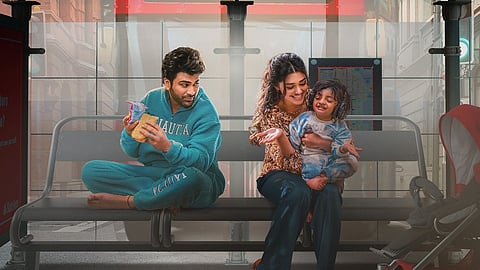Manamey Movie Review: A familiar yet watchable, feel-good romp
Manamey(2.5 / 5)
There has been a lot of conversation recently about man-child protagonists in Indian cinema, but Sharwanand's latest feature, Manamey, takes the trope to another level. The film’s protagonist, Vikram (Sharwanand), is what you would call a classic man-child hero, content to live a carefree life devoid of any real responsibilities. We are told that he is pursuing higher education in London, but what we are shown instead is a flamboyant casanova whose daily schedule revolves around drinking and flirting with women—that is, until a tragic event in a friend’s life compels him to take up the caretaking responsibility of a two-year-old.
Director: Sriram Adittya
Cast: Sharwanand, Krithi Shetty, Shiva Kandukuri, Rahul Ramakrishna, Ayesha Khan
Director Sriram Adittya, fortunately, takes a lighthearted approach to telling the story. Vikram may be the protagonist, but the viewer spends a large part of the first half laughing at his immature and goofy antics rather than laughing with him. After incorporating a brief flashback that highlights Vikram’s sensitive side, the director narrates his scenes in the present timeline in a way that makes Vikram the outlier. When Khushi (Vikram Adittya), the 2-year-old child in question, reaches out to hold Vikram’s hand for the first time, Vikram is rather bewildered by the love than overwhelmed by it. It takes many failures on his end before Vikram finally learns the weight of his responsibility.
This conflict point gets resolved too quickly and conveniently, and Vikram embraces his new role with unwavering vigour. Yet, Manamey largely remains pleasant and enjoyable in the first half because of its playful treatment from Sriram Adittya. It’s a familiar story with a conventional narrative arc, but Sriram Adittya brings a good blend of humour and sentiment to most of the scenes. The director also displays a certain spiritedness when it comes to the use of camera movements and colour scheme. The vibrant colours, particularly well used in Vikram’s outfits, help maintain an upbeat look to the film. Most pertinently, there is a musical vibe to the proceedings that lends Manamey a breezy, seamless quality. Hesham Abdul Wahab comes up with an inspiring soundtrack, besides a unique theme for most scenes, as the film’s two leads, Vikram and Subhadra (Krithi Shetty), come to terms with their new lives.
Even though there are a few wrong notes in the first half—like the out-of-place action scene where Sharwanand thrashes a bunch of goons in an underground parking lot or the stereotypical bad friend who is accompanied by an evil tune every time he appears on screen—Sriram Adittya taps into the emotional core of his narrative every once in a while. When Khushi returns to London, he looks around his house, seeking his parents' touch; only, the parents died a few days ago. Khushi is too young to register the loss or even understand the concept of death, but those around him do. It’s a beautifully poetic moment centred on an actor who can barely speak.
There are a handful of these moments in Manamey that succeed in pulling at your heartstrings. However, Manamey falters in its attempt to work as a love story.
Once the film properly deals with the romantic subplot, the focus veers off of Vikram’s relationship with Khushi, who was earlier promised to be the central conflict. To make matters worse, the second half of Manamey falls into a regular template. As Vikram becomes more overt and desperate in his attempts to win Subhadra’s heart, we meet prototypes far too familiar—an old bohemian couple offering golden advice to the protagonist, a nice boyfriend figure who suddenly turns caricaturish for the sake of it, and so on. Even as Sriram Adittya struggles to conjure a legitimate conflict, Manamey keeps you distracted with these formulaic tropes instead of focusing on the emotional core of its narrative. There are also some silly contrivances in the second half, like a toilet sequence with Karthik (Shiva Kandukuri wasted in a trivial role).
But it’s the emotionally vacuous relationship between Vikram and Subhadra that proves to be most detrimental. In one of the early sequences, Subhadra makes a decision that could put her impending wedding in jeopardy. A tiny sliver of hope sparks at that moment, seeing a female protagonist in Telugu cinema who doesn't fear societal prejudices. Unfortunately, Subhadra’s character arc ends up being the most unexplored in Manamey, as we discover later.
While Vikram becomes more earnest in his life choices, clearly to win over Subhadra, we never truly understand how Subhadra’s feelings evolve for Vikram through their journey together as Khushi's caretakers. So when Subhadra makes the transition from being indifferent about Vikram to warming up to his good side, it feels strangely hollow. This part needed an actor with a greater understanding of nuances, but Krithi Shetty unfortunately comes up short, despite her pleasant screen presence.
Sharwanand, meanwhile, holds his own as Vikram. While he excels in the comic portions, it’s the sombre moments where Vikram is confounded by his growth that the actor surprises with his restraint. During a close conversation with his parents, whom he has been distant from for years, Vikram wonders about the strength it must take a parent to ever let their child go out and live on their own. The question is followed by a heartfelt conversation between him and his parents, where Vikram, in an effort to reunite with Khushi, reconciles with his parents.
There are some beautiful moments in Manamey that deal with the idea of an acquired family. There is also a potentially heartwarming story about two young people redefining the idea of love for themselves. Unfortunately, both of these gentle ideas are trapped in an overall half-baked film that does justice to neither. And yet, it’s hard to dismiss Manamey as a whole for its vibrant energy and a feel-good vibe that is rare to see in films these days.

